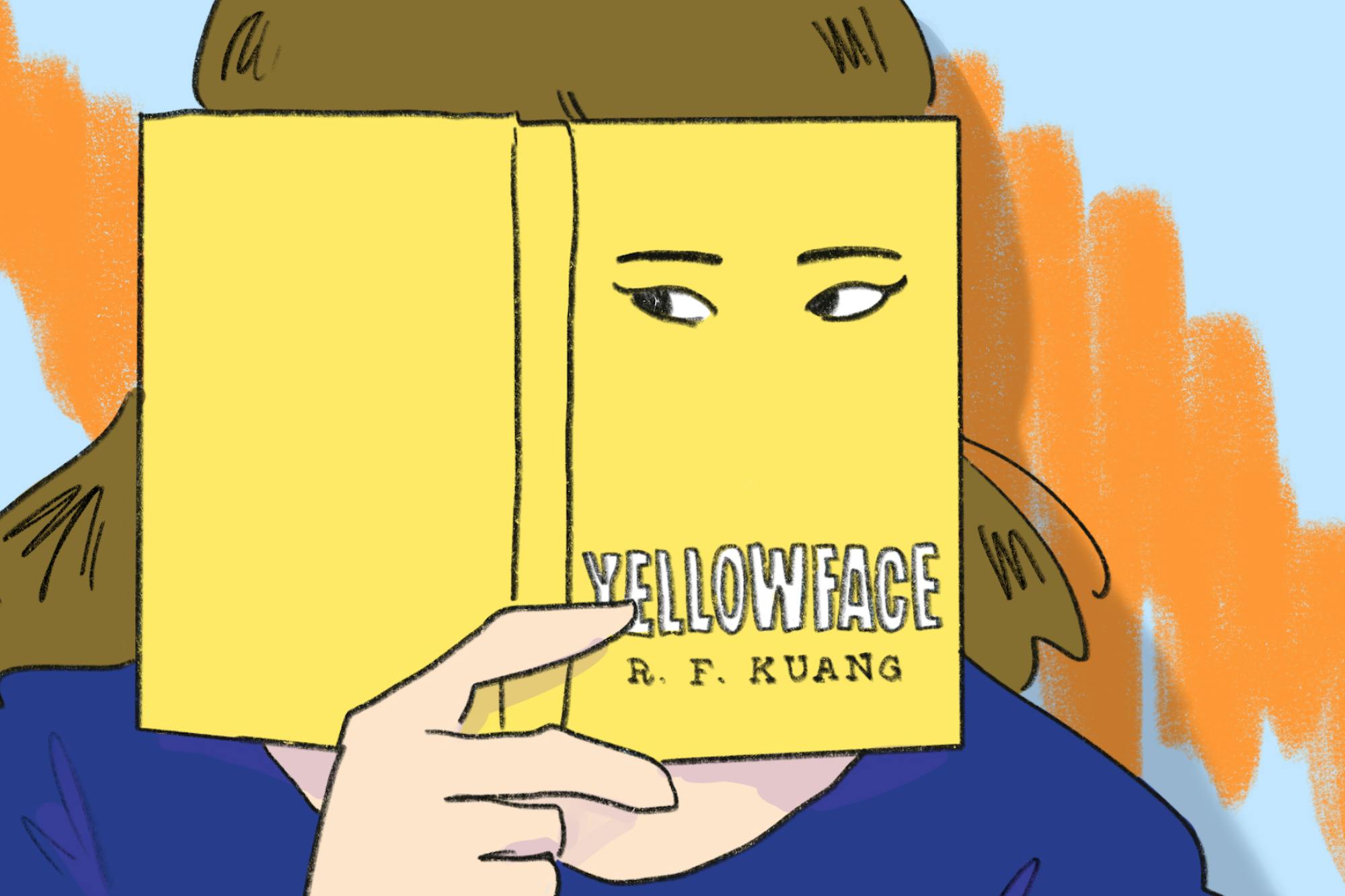Brimming with dark humor and painfully unaware characters, R.F. Kuang’s novel “Yellowface” is a satire that unpacks the difficulty of being an Asian writer in today’s industry. The novel evokes instances of white authors profiting from writing stories about the suffering of non-white communities and real-life, race-based literary controversies — like the “Who is the Bad Art Friend?” feud — a nearly decade-long dispute between writers Sonya Larson and Dawn Dorland regarding race, authorship and friendship that became publicized by the 2021 New York Times article of the same name. Thematically, “Yellowface” is entrenched in the current dialogue regarding the ownership of culture and identity in literature. To tell this tale, Kuang masterfully crafts the narration of her main character to create a voice that is both convincing and appalling.
Protagonist June Hayward is a young writer struggling to sink her claws into the success that lingers in mercurial corners of the publishing industry. June, who describes herself as a “plain, straight white girl from Philly” sulks in the shadow of her literary peer and friend, Athena Liu, who is cooler, more attractive, more “exotic” than June, and whose literary success surpasses June’s biggest dreams. At least, until June witnesses Athena die in a freak accident, during which she steals her late friend’s manuscript, “The Last Front,” a novel about the Chinese Labor Corps, and publishes it as her own under the racially ambiguous pseudonym. As the novel continues, June becomes increasingly unable to escape from the entanglements of her lies and finds herself haunted by the ghosts of the voices she stole.
“I don’t have yellow fever,” June says. “I’m not one of those creepy dudes who write exclusively about Japanese folklore and wear kimonos and pronounce every loan word from Asian languages with a deliberate, constructed accent. Matcha. Otaku. I’m not obsessed with stealing Asian culture — I mean, before ‘The Last Front,’ I had no interest in modern Chinese history whatsoever.”
“Yellowface” breathes life into one of the most unlikable narrators I have ever encountered. June is self-serving, narcissistic, racist and possesses the impressive ability to justify every ethically unsound decision she makes to further her career. The novel’s first-person narration gives readers an unfiltered view into June’s delusions, biases and the mental gymnastics it takes to support her actions. The absence of an intermediary force between this character’s internal monologue and the reader creates a level of instability in the reading experience that is like watching a trainwreck; it left me feeling slightly nauseous and uneasy throughout, but at the same time, I was unable to put the book down.
Kuang’s ability to elicit such a visceral response through her characterization is no easy feat. As a scholar in contemporary Chinese studies and East Asian languages, Kuang centers much of her work around Chinese history and the Asian experience. Her 2022 novel, “Babel: Or the Necessity of Violence,” for example, criticizes British colonialism’s exploitation of Asian cultures with ornate prose and strikingly beautiful, figurative language. Though “Yellowface” tackles related issues, its methods of relaying the novel’s message are entirely different in terms of its use of language. The writing tone is conversational and humorous, not taking itself too seriously. Perhaps Kuang wants us to let our guard down to the informality of the language — making it easier for us to momentarily forget the satire — so the novel can strike us with even more force. June’s voice is fluid and believable, as easy to read as picking a thought out of my own head, which is what makes the satire so effective. Even still, I found myself missing some of the eloquence of her other works.
The part of the novel that stuck with me the most was Athena’s “haunting” of June. Athena’s ghost appears to June many times, the first occurrence being when June thinks she sees her dead friend at a reading of “The Last Front,” and then shortly after in a Twitter account titled “AthenaLiusGhost” that threatens to expose June for the fraud she is. To me, the haunting serves as a way to ground the reader in the truth outside of June’s unreliable narration. June spends so much time refusing to admit feelings of guilt, arguing for her rightful authorship of “The Last Front,” that her subconscious is forced to project itself onto her manufactured reality, becoming a specter of truth in June’s fraudulent life.
Additionally, the spectrality of the stolen work June publishes conjures both the angry ghost of Athena and those of all the Asian women (and men) whose legacies have been misrepresented by June’s involvement in editing “The Last Front.” June has contributed to a tradition of robbing Asian and female voices, an action that even her twisted conscience cannot make peace with. The villain of June’s story, Asian American editorial assistant Candice, asserts that the “industry is built on silencing us, stomping us into the ground and hurling money at white people to produce racist stereotypes of us.” In most other accounts, Candice would not have been framed as a villain. By placing June’s voice at the forefront of the narrative, this novel uses perspective to show how easily certain voices can be overshadowed by whoever controls the cultural airspace. It is not an accident that to achieve this, Kuang found it most effective to speak through a white narrator.
In discussing themes like race, appropriation and authorship, “Yellowface” offers incisive commentary on the writing industry through these lenses. As the novel depicts June complaining about the industry’s lack of desire for “white stories” and narratives and attributing her lack of success to her lack of “diversity,” it simultaneously shines a light on the commodification of Asian (and other underrepresented) stories and writers.
Rating:★★★★☆




